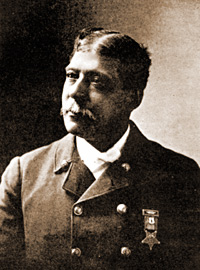June 19, 2020:- This Juneteenth please take some time to remember James H. Wolff, Esq., a naval veteran of the Civil War and co-founder of the first Black law firm in Massachusetts.
Wolff was just 14 when he enlisted in the US Navy at the outbreak of the Civil War. Born to free parents in New Hampshire, he must have known that by volunteering to fight the Slave Power he was at risk of losing both his liberty and his life. Live free or die were the conditions of his daily life, not simply a motto.
He was aboard Minnesota when she bombarded the Confederates into surrender at Fort Hatteras, and when she became a stationary target for enemy fire after running aground early in the Battle of Hampton Roads. Three of her crew died in that engagement.
Wolff survived the battle and the rest of the war, and went on to practice law in Massachusetts. Twenty years after the war’s end and the passage of the Massachusetts anti-discrimination act, Wolff represented the plaintiff in a case that tested the statute’s limits and led to its expansion. His client in that 1885 case, Edward E. Brown, also happened to be his law partner. Together with attorney Edwin Garrison Walker, Wolff and Brown established the state’s first Black law firm. It was a firm with a mission.
After the decision of the Supreme Court of the United States in the Civil Rights Cases, 109 U.S. 3 (1883) that Congress lacked the constitutional authority to prohibit private discrimination (effectively neutralizing the federal Civil Rights Act) Wolff and his partners helped lead the campaign for stronger state-level legislation in Massachusetts. One element of that campaign took the form of a lawsuit against a Boston skating rink that refused to sell tickets to people of color. Brown was a plaintiff, and Wolff his attorney. They won.
Coordinating the case and legislative effort to enforce and amend the 1865 law was the Wendell Phillips Club, which functioned as a sort of precursor to the NAACP, bringing together business owners, ministers, and lawyers in the cause of civil rights. Walker, Wolff, and Brown were at the forefront, litigating and lobbying for liberty pro bono publico while somehow bringing in enough billable work to pay the bills and raise their families (both of Wolff’s sons followed him into the law, by the way).
For a fuller account of the case, see my article “The Genesis of the Black Law Firm in Massachusetts,” Massachusetts Legal History 5 (1999). Not quite everything ever published is available online, it seems, so if you would like a copy, email your request to peter@petervickery.com.
In the meantime, please devote a few moments of thought to James H. Wolff. An exemplar of physical and moral courage, he is worthy of remembrance.

